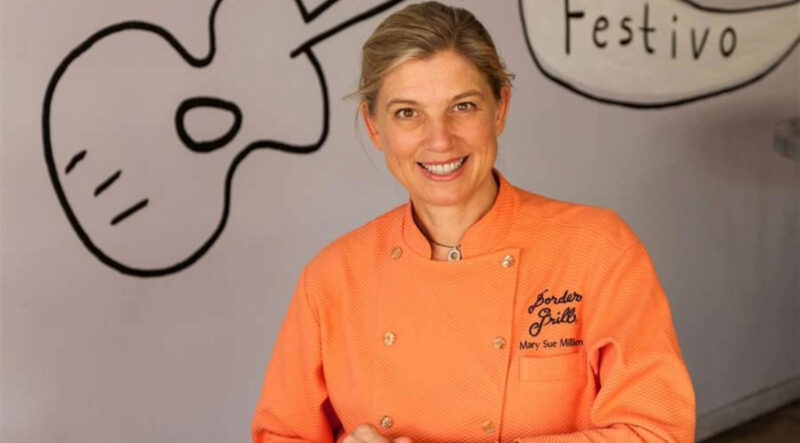America aims to boost aquaculture with SEAfood Act
Top chefs hail science-based bipartisan bill that will put more affordable and homegrown seafood on US plates and menus
By Fabian Dawson
SeaWestNews
The growth of aquaculture in U.S. federal waters got another boost this week with the introduction of a bipartisan bill that lays the groundwork for an equitable seafood economy of both farmed and wild-caught fish.
The Science-based Equitable Aquaculture Food Act, or SEAfood Act, was introduced by Representative Nancy Mace (R-SC) and Representative Jimmy Panetta (D-CA).
“We are grateful for the bipartisan leadership of Representatives Mace and Panetta to advance the growth of aquaculture in U.S. federal waters,” said Andrew Zimmern, an award-winning chef and founding member of the Coalition for Sustainable Aquaculture.
“It’s a responsible, science-based approach that’s good for the economy, for our domestic seafood industry, for our ocean and for American consumers,” he said.
The SEAfood Act is the only measure in Congress that lays the groundwork for an equitable and inclusive seafood economy of both farmed and wild-caught fish while prioritizing data and science in the development of offshore aquaculture in the U.S.
It will be a critical first step to help meet growing consumer demand for seafood and create jobs in vulnerable coastal communities in the future.
“As a chef, I love using fresh, local ingredients. But when it comes to seafood, there just isn’t enough of it,” said Mary Sue Milliken, California-based chef and co-founding CSA member.
“The SEAfood Act is a science-based approach that will lay the foundation for sustainable, equitable offshore aquaculture in the U.S. so we can put more homegrown seafood on plates and menus.”
Up to 90% of the seafood consumed in the U.S. is imported, and half of that is farmed.
The development of offshore aquaculture can help meet the increasing demand for homegrown seafood and add stability to the domestic seafood supply chain, but the U.S. currently lacks a federal regulatory framework with the requisite strong standards needed for sustainable, equitable and profitable offshore aquaculture.
“I’m a fisherman, and the truth is wild-caught fish alone can’t meet the growing demand for seafood,” said Trey MacMillian, owner of CSA’s Lowcountry Oyster Co. in South Carolina.
“Sustainable offshore aquaculture can help, and it creates jobs. The SEAfood Act is the responsible first step to developing this industry,” he said.
Among the proposals in the proposed Act include the creating of a grant program to establish aquaculture centers of excellence that meet the needs of a booming aquaculture industry.
According to Seafoodsource.com US lawmakers have introduced several provisions to grow support for aquaculture within the federal government this year.
Over the summer, legislators have introduced the Advancing the Quality and Understanding of American Aquaculture (AQUAA) Act, which would establish national standards for offshore aquaculture and streamline development – the Sustaining Healthy Ecosystems, Livelihoods, and Local Seafood (SHELLS) Act, which would create a new office of aquaculture within the U.S. Department of Aquaculture – the Supporting Equity for Aquaculture and Seafood (SEAS) Act, which would ensure fair treatment for aquaculture producers within USDA programs – and the Coastal Seaweed Farm Act, which would study the benefits of seaweed farming and provide grants for indigenous communities.
As America forges ahead with strengthening its seafood security, Canada’s Liberal government continues to be unduly influenced by aquaculture detractors and activists rather than relying on science and traditional indigenous knowledge to grow the industry.
About 40 per cent of the BC in-ocean salmon farming sector has already been closed, despite government scientists and court rulings stating that the salmon farms in BC pose less than a minimal risk to wild stocks.
There are now several legal challenges mounted by First Nations, aquaculture service and supply companies, and salmon farmers, over the decisions to shut down fish farms in British Columbia’s Discovery Islands.
The Canadian Aquaculture Industry Alliance (CAIA) has said shutting salmon farms in British Columbia against the wishes of First Nations rightsholders and the advice of the government’s own scientists deeply undermines the confidence in Canada’s aquaculture sector.
“This is happening while other nations move ahead with expanding their aquaculture production with bold goals for growth,” said CAIA, the voice of Canada’s seafood farmers, who employ over 20,000 people across the country.
“We need the strong and clear support of governments who recognize that aquaculture is the future of reliable, secure, sustainable and affordable supply of seafood and job creation in rural, coastal and Indigenous communities across Canada,”
“And we need a strong and reliable regulatory framework for investment that provides clear goals and stability so that companies can trust that their long-term investments will be respected,” said CAIA.
Image shows Mary Sue Milliken, California-based chef and co-founding CSA member

